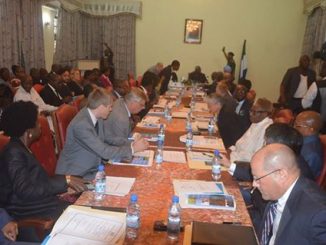
Great anger and violence can never build a nation – Op ed

By Abdulai Mansaray
Henry Cate once said that “the problem with political jokes is that they get elected”. Looking at the scenes that broke out in the Well of the Parliament of Sierra Leone on the 23rd of November this year, the above cannot be farther from the truth. Watching the scenes on social media, you could be forgiven to think that you had a ring side seat at the MGM Grand, Caesars Place or the Las Vegas Convention Centre. Unfortunately, what happened on this day cannot be considered a joke, but an utter disgrace from what passes for our political representatives.
According to thesierraleonetelegraph.com, “members of Parliament went on the rampage, hurling objects and punching one another as Speaker-Dr Abass Bundu, lost control in an ill-tempered debate over new electoral laws that could govern presidential and general elections next June”. The new electoral laws centred on the introduction of “The Public Elections (District Block Proportional Representation System) regulations 2022 and the Public Elections (Local Councils proportional Representational System. According to the headline, “opposition MPs refused to debate proportional representation laws”. Phew.
On January 6th last year, the world saw in live stream, how a mob mounted one of the most savage attacks on the United States Capitol Building in Washington D.C, and in effect the seat of power and American democracy. Unlike the American attack, which was by a section of the public, the attack in Sierra Leone was orchestrated by the very people that we elected to promote, protect and represent us in parliament. When we said that we elected you to fight for us, we didn’t mean it in literally. We meant to protect our rights against the excesses of any given government. Some people would like to point to other countries where such incidents have taken place as if an excuse to do so.
There is no doubt, that those who participated in the brawl might have been driven by their belief and passion to defend their corner. It would be naive to expect a parliament made up of different opposing political parties to agree on everything, and anything, every time. We expect our parliamentarians to agree to disagree in the interest of the country. However, where such a well (pardon the pun) of opposition exists, the worst the people of Sierra Leone would expect from our representatives is “heated debates”- “Das all”.
The behaviour of our politicians is not something anyone can condone or defend. Nevertheless, we can agree that such behaviours are sometimes fuelled by passion. However, in demonstrating such passion with such a behaviour, Despite the passion, does that lend credence to the notion that politics is for people who have a passion for changing lives, but lack of passion for living it? This behaviour is unforgiveable. It brings into question, whether those who engaged in such a disgraceful behaviour have any moral rectitude left, to condemn the behaviour of the rioters, which left six police officers and at least twenty one civilians dead in August this year. What kind of example did these politicians think they were setting for our young impressionable minds? Were these politicians giving a constitutional seal of approval to violence?
This article is not aimed at the constitutional merits or demerits of the debate at hand. It is not aimed at adjudicating on who was right or wrong? The constitutional gymnastics involved are beyond the intellectual demands of some of us. Guilty. Nevertheless, it is worth asking certain questions around the subject. In 6 months’, time, we would be going to the polls, ironically to choose the party to blame for our economic, social and financial woes as a country. The process of doing so is euphemistically called democratic elections. Some people have questioned, with 6 months to the elections, why is our parliament introducing such a monumental election change at such short notice? Many would want to know why this was not introduced over the last 48 months. It is against this backdrop that some people and especially the opposition see this move as cynical and suspicious.
In some quarters, some political connoisseurs have questioned the validity of such a change in relation to the time. They argue that the right to vote is a sacrosanct and constitutional right of every adult Sierra Leonean. Is it imperative that voters know and understand the process by which their votes would be translated into their representation? However, if the electorate is expected to vote as per the constitution, should there be an expectation that the average voter understands what they are voting for? Does the average voter understand the concept of Proportional Representation? Has the average voter been sensitised on the concept?
Have we given ourselves enough time to get the message through to the voters? Should voters understand how their ballot would represent the outcome of the political landscape? Is the 6 months enough to educate the average voter on the new political change? If someone votes in or for a system whereby the individual does not have the foggiest idea about the implications or political gymnastics involved, does that validate such a ballot as “cool”? Or is that an informed choice they would have made?
Nevertheless, we cannot pretend that Proportional Representation is a new vocabulary in our political lexicon. This idea has been bandied around by our two main parties, the SLPP and APC since the beginning of time. The cynics, the opposition, and political armchair purveyors would wonder, “why now” and six months to a general election? This is not to provide succour or justification to these political changes that seem to have a ring to them.
Why do our politicians choose to make constitutional changes on the eve of our general elections?
A Constitutional Review Committee (CRC) of more than 80 people conducted extensive consultations across the country, to review the 1991 constitution when the APC was in power. In its 680 page report, it made 134 recommendations, including the abolition of the death penalty, provisions on the economic, social and cultural and equality of women.
According to Amnesty International, the government rejected 100 of the 134 recommendations, which it described as a “missed opportunity”. Interestingly, the final report was presented on the 24th of January 2017. But the government did not publish its official response to the recommendations until 10th November 2017, 4 months to the general elections slated for March 2018. We all witnessed the furore that followed some of these changes, including the “Two Sim” wahala, thanks to Mr Kandeh Yumkella’s attempt to join the musical chairs.
So, we can all agree that the APC and SLPP are reading from the same hymn sheet. What we see that is different is how they deal with these political upheavals, when one tire to three-foot the other. Both political parties play the same tricks to decide on the shoe size of Cinderella, before the main dance is yet to come. What we see here is the difference in how each party deals with or reacts to the others slight of hand. Is it a question of “Cunning man die, Cunning man behrrrr?”.
When the APC rubber stamped those constitutional changes, did the SLPP organise a boxing match? The SLPP was notoriously known for throwing the baby out of the pram when they were in opposition. The boycotted many political sittings and debates whenever the APC tried to haul them over the coals.
So, do our politicians need to lose control to such an extent that they can treat the country to matinee of a free boxing match? Is this what we voted for? Is this the best example we can set for the young generation? What makes this sad saga laughable at times, is the fact that it took place while President Bio was away. This is not to suggest that President Bio’s presence would have prevented such a crass behaviour. No guarantees intended. However, considering that President Bio is symbolically the Head of the Nation, was this a question of “when the cat is away, the mice will play”? What we saw in the Well of our parliament was nothing short of playground antics. Does that mean that our politicians need adult supervision? At all times? The next time President Bio wants to travel out of the country, should he inform social services to avoid a safeguarding referral for leaving adult kindergartens unsupervised?
On a serious note, when you look at the timing of these constitutional changes that have been taking place in our country, you cannot help but conclude that the APC and SLPP are two peas in a pod. While most or all countries in the world conduct censuses to help devise government policies in calibrating their countries’ educational, social and economic needs, SLPP and APC parties do so to draw up new battlegrounds that they euphemistically call “delimitation of political boundaries”. And they do so when elections are round the corner.
Both parties decide that the best time to fidget the constitution is when it is close to elections. One decides to boycott when they disagree with the other. Where is Martin Luther King or Indira Ghandi when you need one? The other decides to hire the services of Don King when it does not go their way.
When you look at the timings of their political charades, there can be no justification for this constitutional alchemy. They make constitutional amendments with one eye on the next election. And that is the difference between a statesman and a politician.
A politician thinks about the next elections, while the statesman thinks about the next generation (Churchill). Since these politicians are elected officials, is it a question of we get what we deserve? We hope that our politicians develop a passion for learning from this debacle. If they do, they will never cease to grow.
Don’t forget to turn the lights off when you leave the Parliament.


